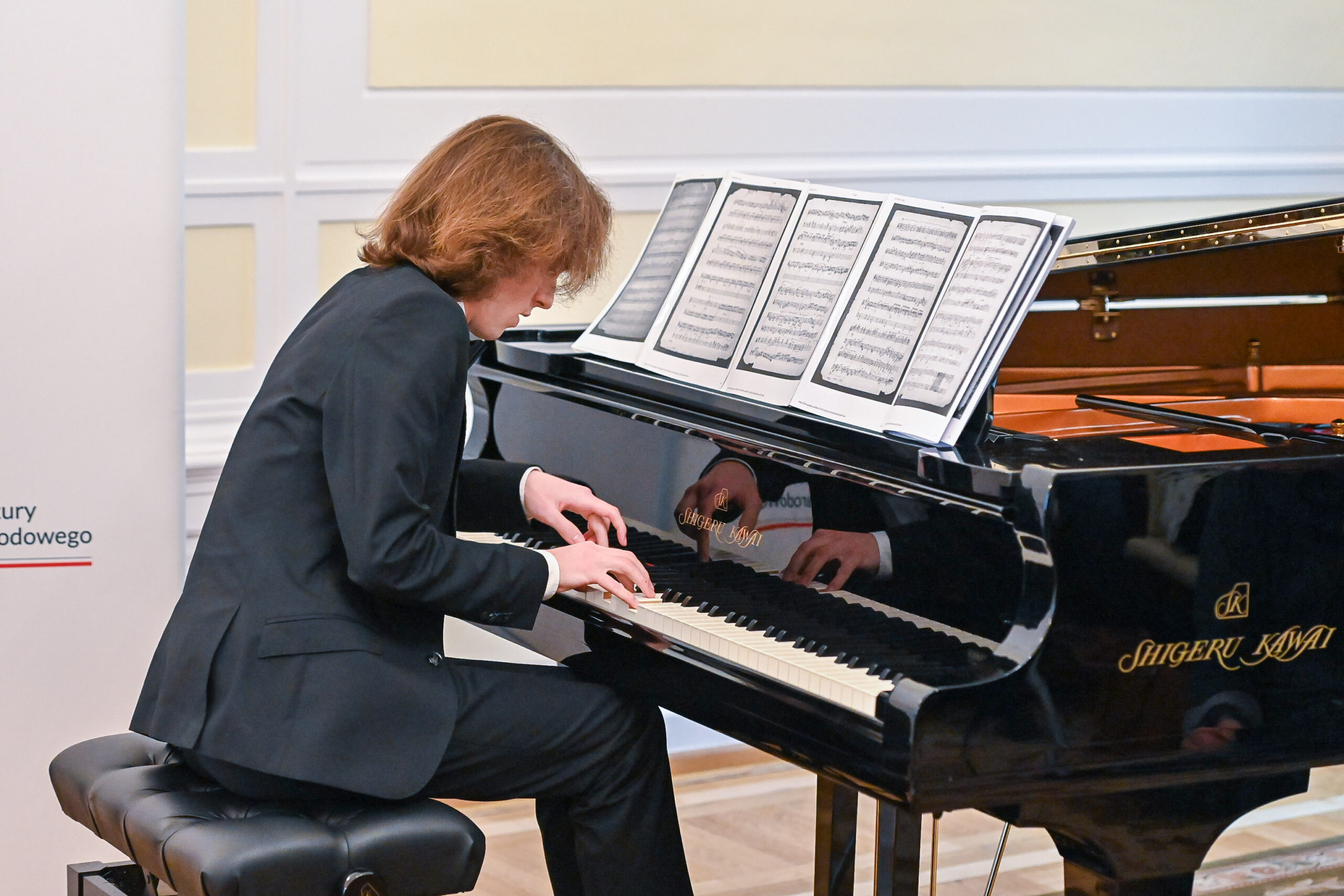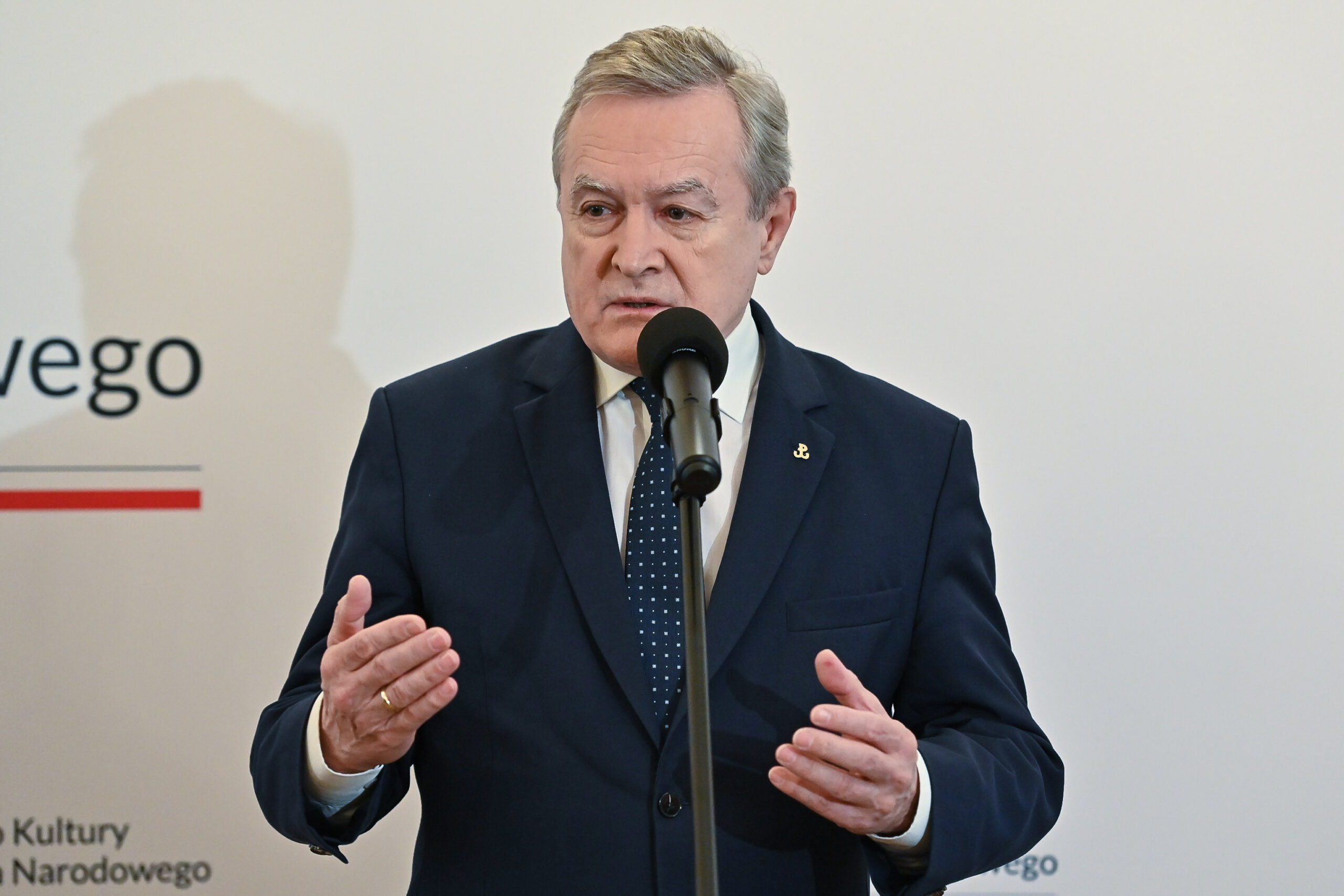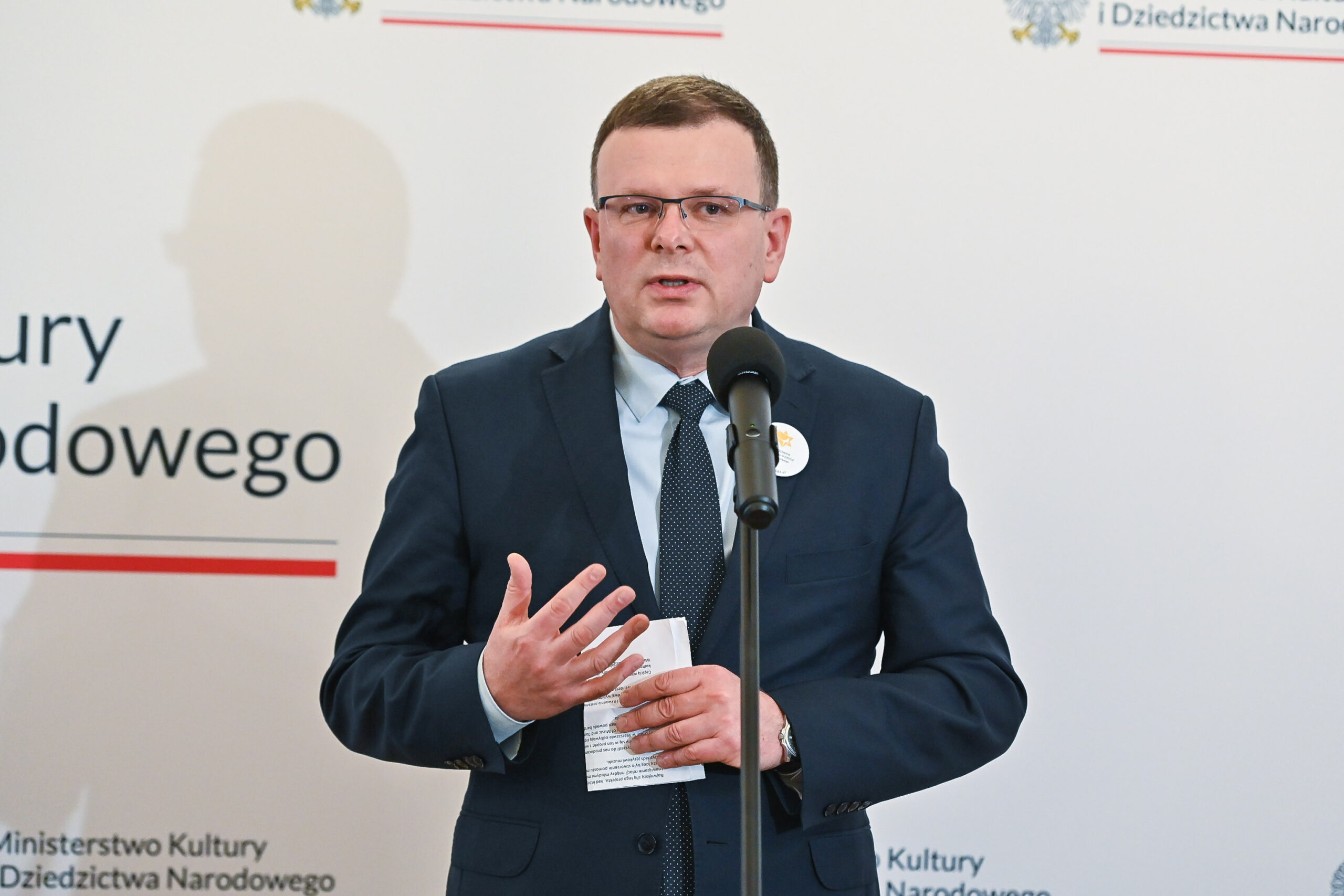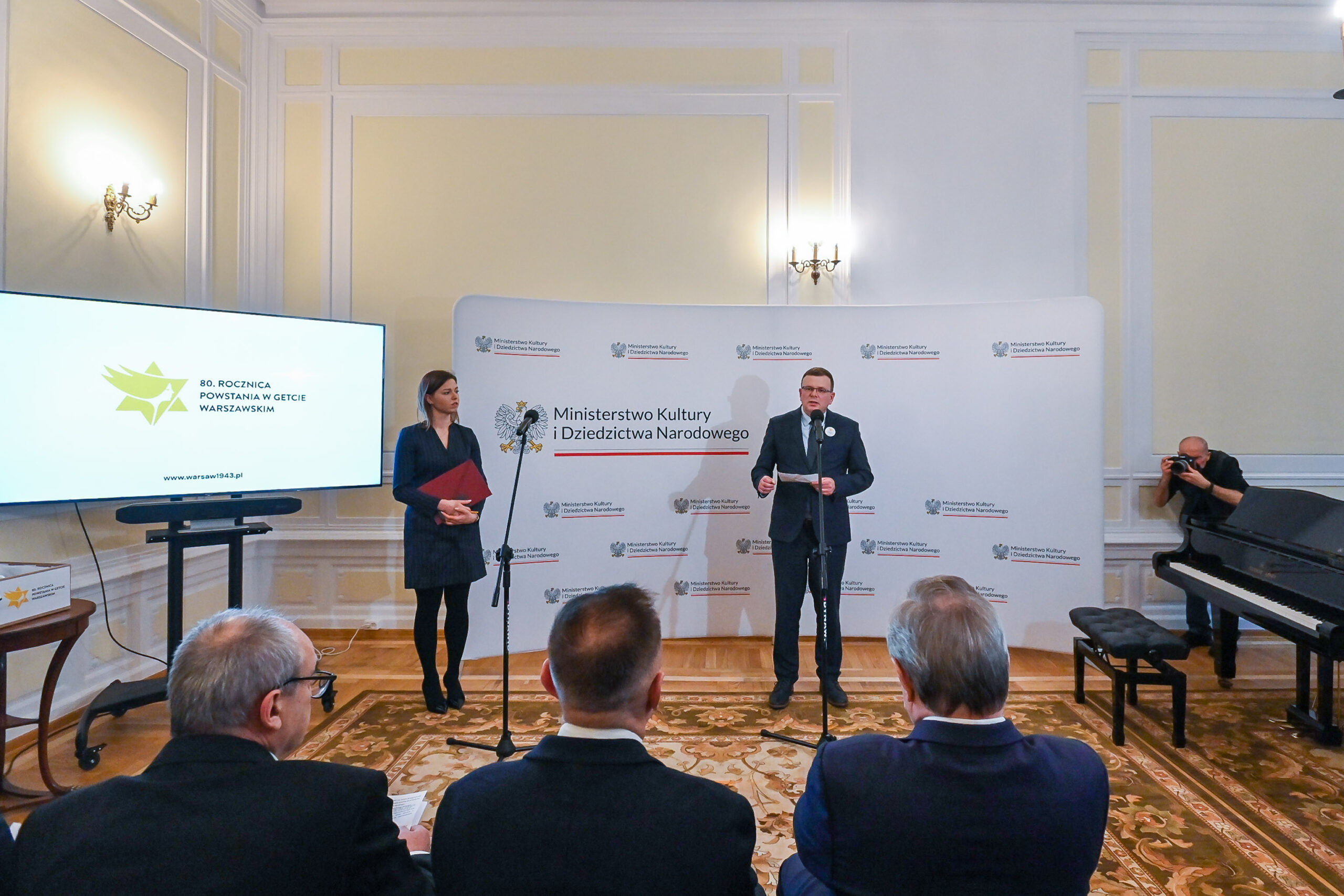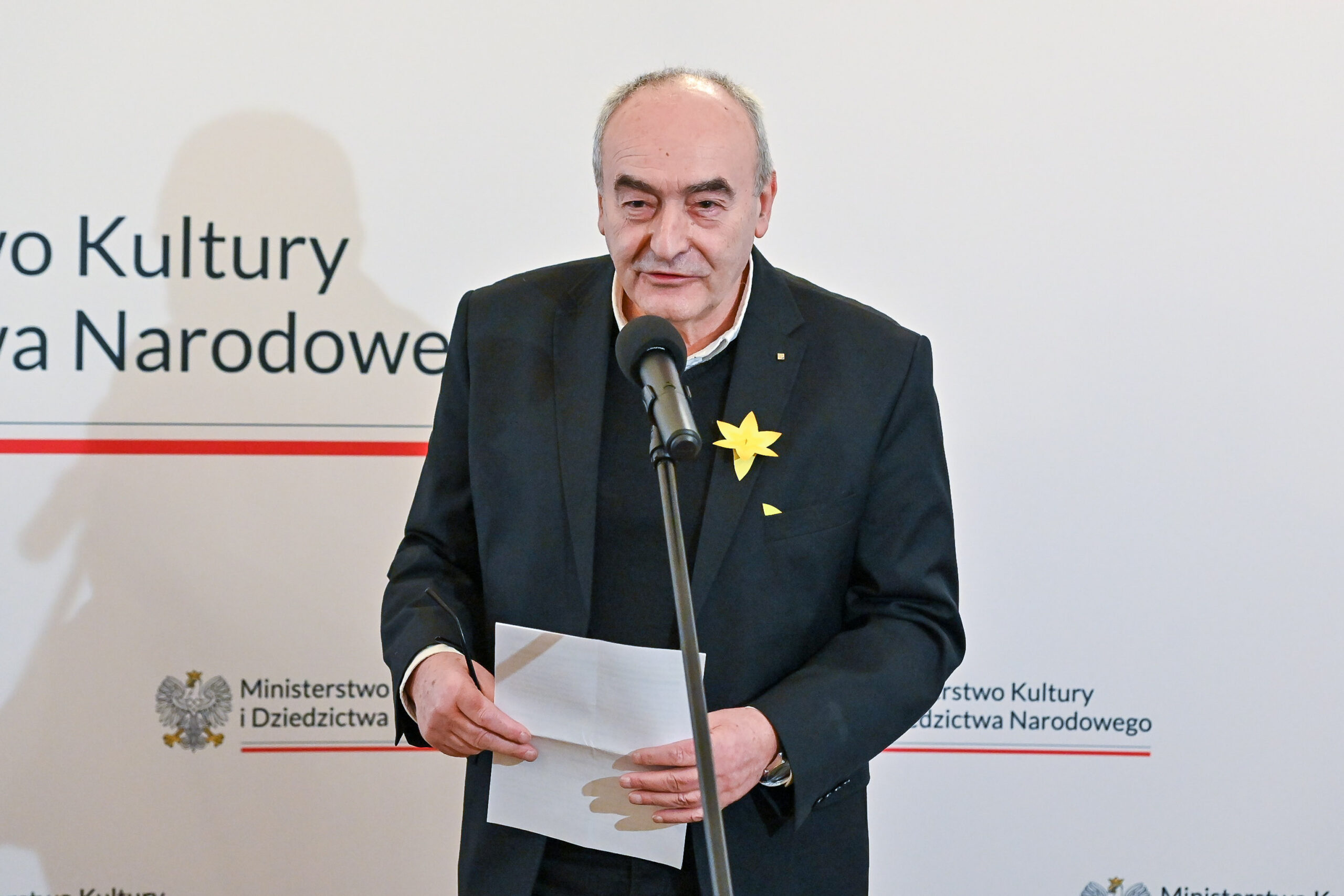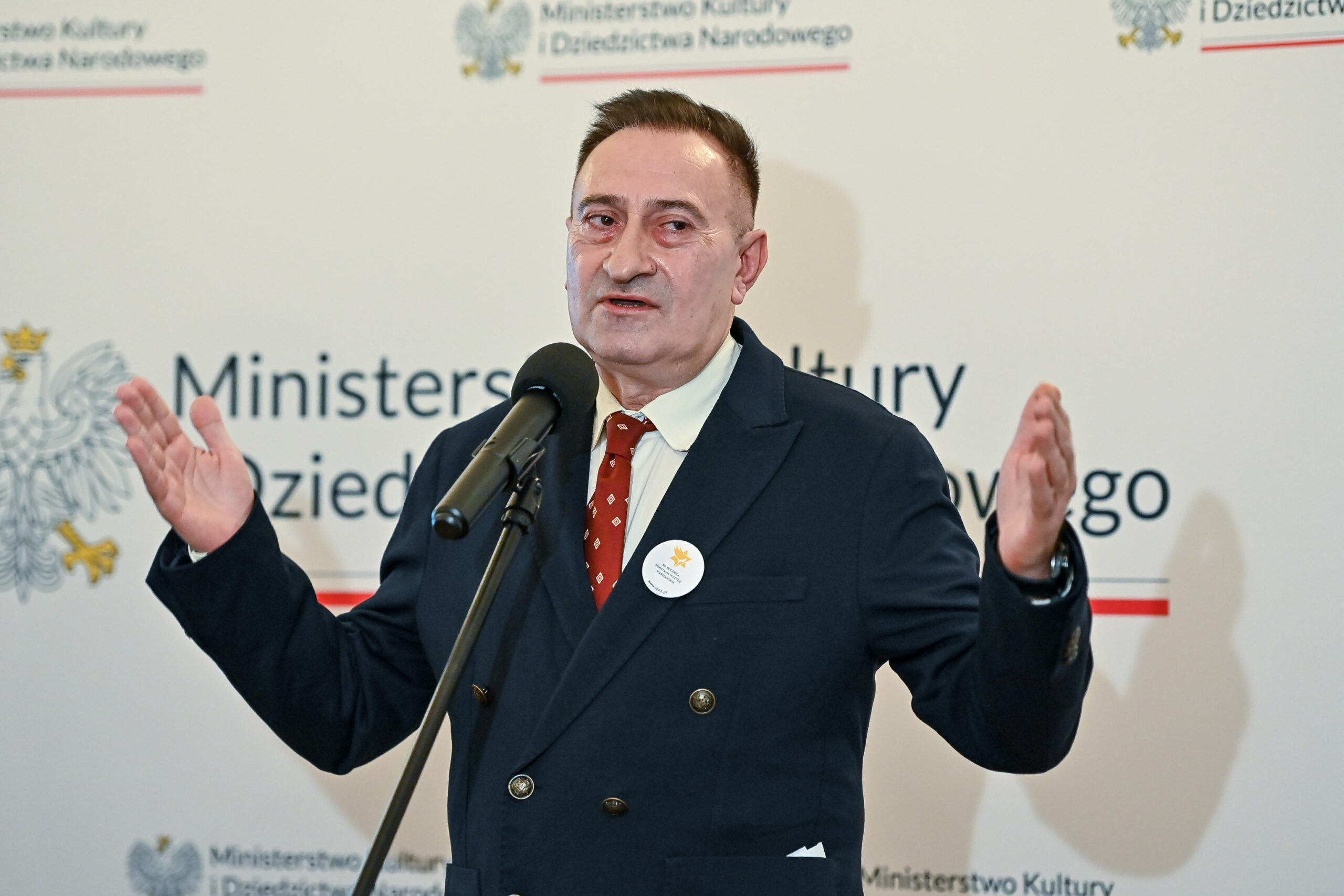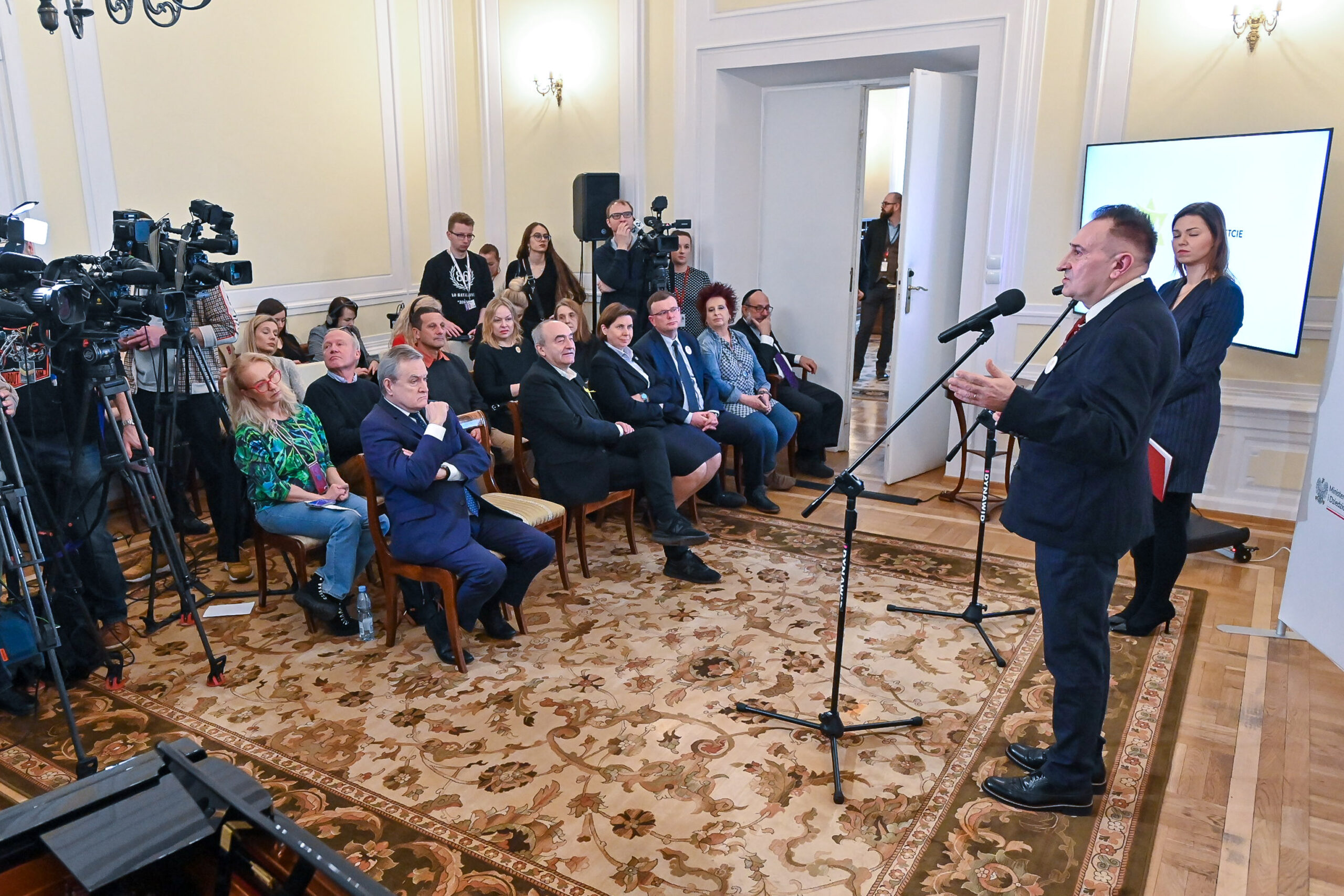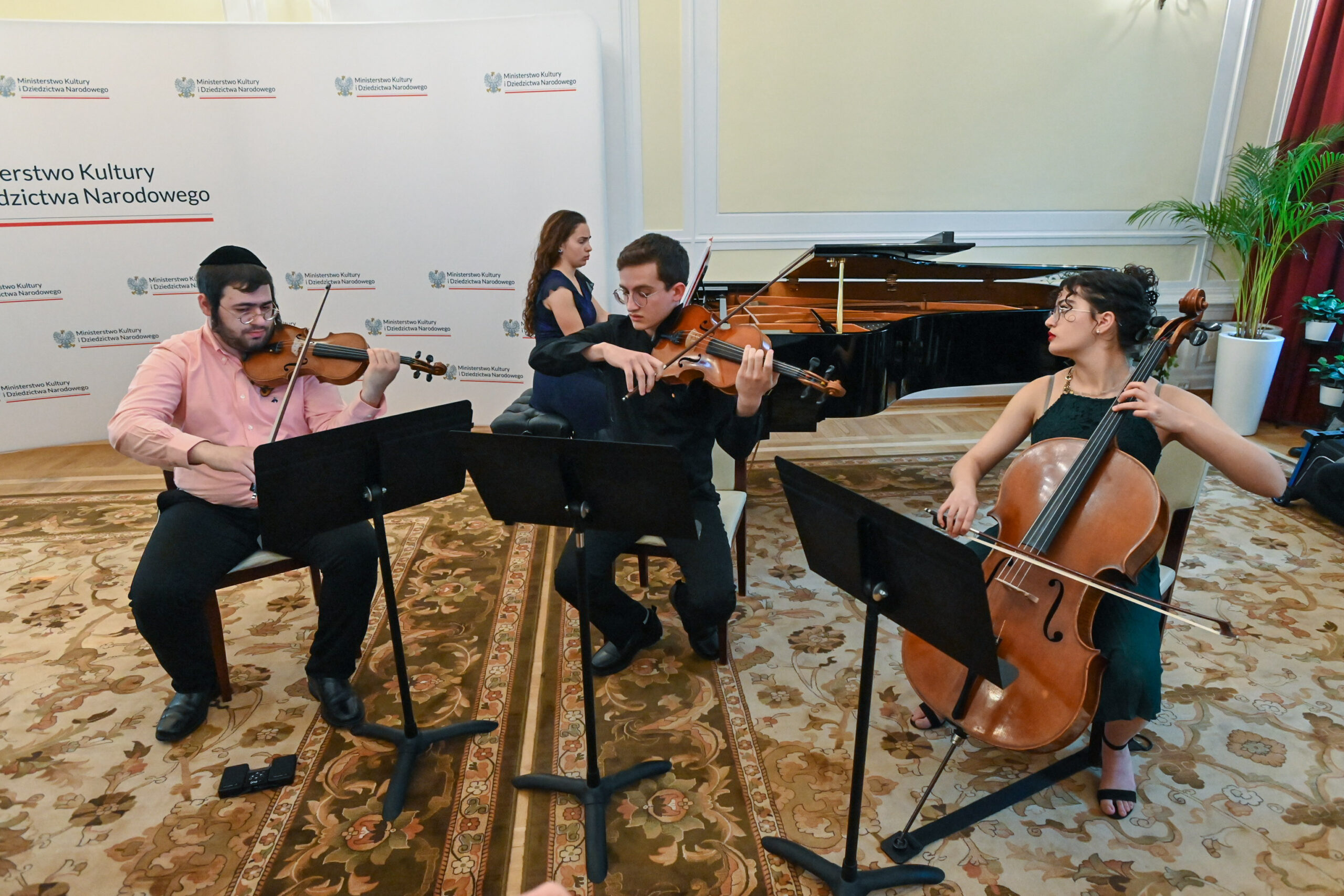On 15th February, a press conference was held at the Ministry of Culture and National Heritage in connection with the upcoming celebrations of the 80th anniversary of the Warsaw Ghetto Uprising.
The conference was opened by the Deputy Prime Minister, Minister of Culture and National Heritage Professor Piotr Gliński, who emphasised that the Warsaw Ghetto Uprising became an everlasting symbol of the resistance of Polish Jews against the Holocaust and recalled that it, was the first metropolitan uprising in Nazi-occupied Europe.
The conference was attended by the representatives of institutions which co-hosted the event: Albert Stankowski – Director of the Warsaw Ghetto Museum, Zygmunt Stępiński – Director of POLIN Museum of the History of Polish Jews, Artur Hofman – Chairman of the Social and Cultural Association of Jews in Poland and Monika Krawczyk – Director of the Jewish Historical Institute, who reported on selected events from the rich calendar of celebrations of the 80th anniversary of the Warsaw Ghetto Uprising. Nearly 40 institutions will be taking part in the celebrations, and information on all the events organised by them is available in the events calendar at: https://www.warsaw1943.pl/
One of the major initiatives on the part of the Warsaw Ghetto Museum is a grand concert by Polish-Israeli symphony orchestra, which will take place on 19th April 2023 at the Grand Theatre – National Opera. The orchestra will be conducted by the award-winning conductor Anna Sułkowska-Migoń. The importance of the event is underlined by the fact that it will be held under the honorary patronage of the President of the Republic of Poland, Andrzej Duda. The concert is not only a meeting of young musicians from Poland and Israel aimed at fostering mutual respect for their common, centuries-long history; but its primary goal – says Director Albert Stankowski – is to break all barriers and stereotypes, and develop new relationships between the young generations of Poles and Jews. Therefore – still keeping the past in mind – we will give a concert for the future. The concert will include a performance of the Symphony No. 8 “Polish Flowers”. This symphony was authored by two outstanding artists of Jewish descent – the composer Mieczysław Weinberg and the poet Julian Tuwim, author of the timeless poem titled “Polish Flowers”. During the concert, a piece composed especially for the occasion by a well-known composer, Elżbieta Sikora will also be presented.
Another important event hosted by the Warsaw Ghetto Museum is an exhibition titled: “The Memory of 1943” whose opening has been scheduled for 30th March 2023 at Kordegarda Gallery in Warsaw. he exhibition will showcase artefacts discovered during the excavation works carried out by the Warsaw Ghetto Museum in 2022 in the vicinity of the so-called Anielewicz Bunker – daily life objects (i.e. mirror, baby pushchair, cups, bottles), fragments of Jewish religious writings and novels in Polish, as well as prayer items.
Another item on display will be the Stroop Report, which has been handed over to the Warsaw Ghetto Museum on deposit by the Institute of National Remembrance. This report shows the events in the Warsaw Ghetto from the point of view of the oppressors, thus becoming a testimony of blame and a document of the times of hate. Although over the years, the memory of the Uprising has been shaped by the voices, memories and records of its survivors – fighters and witnesses on both sides of the wall, as well as by the successive generations of historians, the dominant visual messages i.e. photographs included in the Stroop Report – have been the recorded of the perpetrators. The exhibition confronts these photographs with objects excavated from the cellars of the destroyed tenement house at 18 Miła Street, which serve as transmitters of the memory of the former inhabitants of the ghetto. Mr Stankowski emphasised that the great merit of the exhibition is the clash between these two narratives. Rusty, smashed, partly burnt and damaged artefacts – says Mr Stankowski – after decades of being buried in the ground show both their fragility and strength, becoming a testimony for those who hid from the enemy, fought and died. In three years’ time, both the artefacts discovered during the excavations and the Stroop report will become part of the permanent exhibition of The Warsaw Ghetto Museum in its final location – the former hospital building of the Bersohn and Bauman Foundation.
The 80th anniversary of the Warsaw Ghetto Uprising is also an opportunity to talk about the roots of the armed resistance of April and May 1943 and about the memory of the revolt in the post-war period. The Jewish Historical Institute in Warsaw has prepared two temporary exhibitions, a programme of side events and a scientific conference. One of the major tasks of the Jewish Historical Institute is to nurture the memory of the wartime experience of the Jewish community and to collect evidence of Nazi crimes from World War II. In this remarkable year, we would like to draw our attention not only to the armed combat but also to the civil resistance, showing the path that led to the revolt of 19th April 1943. The significance of the Uprising for future generations, and for Holocaust survivors, must not be forgotten either. This message can be seen, among others, in fine art, as anyone viewing our next temporary exhibition will be able to see – says Monika Krawczyk, Director of the Jewish Historical Institute.
On 21st April 2023 at the Jewish Historical Institute (3/5 Tłomackie St.), visitors will be able to see the first ever exhibition showing how artists of the early post-war period depicted armed resistance in the ghetto. The exhibition titled “Monuments of Resistance. Fine Art vs. the Warsaw Ghetto Uprising 1943-1956” will include artworks mostly derived from the unique collection of the Institute. Artists whose works will be on display include: Alina Szapocznikow, Natan Rapoport (i.e. designer of the Warsaw Ghetto Monument), Henryk Hechtkopf, Bronisław Linke, Tadeusz Kulisiewicz, Andrzej Wajda, Eryk Lipiński, Tadeusz Gronowski and Ignacy Witz. The exhibition will be accompanied by a rich selection of side events and an illustrated catalogue.
The Jewish Historical Institute will also host an annual March of Remembrance that will take place on 21st July 2023 at 6:00 on the eve of the large-scale liquidation of the Warsaw Ghetto, during which the Germans deported almost 300,000 Jews from Warsaw to Treblinka death camp. The participants of this year’s March will walk the symbolic route from death to life, leading from the Umschlagplatz to the square on the junction of Solidarności Avenue and Andersa Street, the heart of pre-war District of Muranów.
Meanwhile, the outdoor exhibition accompanying the March “Roads to Uprising. Resistance in the Warsaw Ghetto” will focus on the different facets of the struggle against the occupant. The exhibition will show us the everyday life of the Ghetto residents, which we can explore thanks to the tremendous efforts of all those who wanted the world to know their story – such as e.g. members of the Oneg Shabbat – the group that created the underground Ghetto archive. This unique exhibition shows that even long before the onset of the Ghetto Uprising there was civil resistance and struggle: not only for life, but also for human dignity. An important element of the exhibition will be the flora selected on the basis of the pioneering, post-war research of botanist Roman Kobendza, who on the rubble of the ghetto found certain plant species capable of surviving even in extremely unfavourable conditions.
POLIN Museum (ul. Anielewicza 6) together with its many collaborates from Poland and abroad has prepared a year-long programme entitled “Don’t be indifferent”, which refers by its title to the so-called 11th commandment recalled by Marian Turski during the commemoration of the 75th anniversary of the liberation of Auschwitz-Birkenau. At times when there is war beyond our eastern border and refugees from Ukraine are being welcomed into our family homes, the importance of this message is becoming increasingly important. On the 80th anniversary of the Uprising, POLIN will commemorate the Fallen and give voice to the Survivors. Throughout the entire year there will be an ongoing discussion about indifference – How do we understand it today? Therefore, in its programme, the Museum will also address topical issues such as e.g. world hunger, during a lecture delivered by a reporter, Martin Caparrós – said Zygmunt Stępiński, Director of POLIN.
A crucial element of the agenda will be the opening on 18 April, on the eve of the 80th anniversary of the Warsaw Ghetto Uprising, of the temporary exhibition “The Sea of Fire Around Us” at POLIN – For the first time we will talk about a side of the Uprising that is not commonly known, we will give voice to the civilians who were hiding in the Ghetto. In spite of their despair, hunger, fear, inhuman conditions, they fought for every “day, hour and minute”. There were about 50,000 people, and their resistance was just as important as the armed one – this is how the event has been described by POLIN. We will see, inter alia, original photo plates and photographs from the Warsaw Ghetto Uprising taken by Zbigniew Leszek Grzywaczewski, which were found after nearly 80 years in the family collection of his son, Maciej Grzywaczewski. Professor Barbara Engelking is the author of the exhibition concept, and the exhibition manager is Zuzanna Schnepf-Kołacz. The exhibition has been co-hosted by Association of the Jewish Historical Institute of Poland and the Polish Centre for Holocaust Research of the Institute of Philosophy and Sociology of the Polish Academy of Sciences.
For the 11th time, the POLIN Museum will also be hosting the socio-educational “Daffodils Campaign” whose annual theme is “Remembering Together” – I can already say that we have succeeded in breaking a record: 3,700 volunteers have signed up. On the streets of Warsaw, with their help, we want to distribute 450,000 paper flowers. This number symbolises the number of Jewish women and men who were confined to the Warsaw Ghetto at the time of its greatest overpopulation – in the spring of 1941. In addition, on the initiative of Warsaw Mayor Rafał Trzaskowski, 150,000 daffodils will be distributed among Jewish communities and organisations worldwide. The initiative has been supported by Ronald S. Lauder, Chair of the World Jewish Congress and member of the Council of the POLIN Museum – said Zygmunt Stępiński during the conference.
In 2023, exceptionally and for the first time, daffodils will also be distributed by volunteers in five Polish cities: Lodz, Cracow, Wrocław, Bialystok and Lublin. Until 14th April, schools, libraries and cultural institutions from all over Poland can still sign up for the campaign and receive free educational materials: ready-made lesson plans and aids for teachers and educators to help them prepare classes on the anniversary of the Warsaw Ghetto Uprising. This year the Museum has released a cartoon titled “To Steal a March on God” based on a novel by Hanna Krall, whose online premiere show will take place on 19th April.
The Social and Cultural Association of Jews in Poland is the only Jewish organisation that, since the post-war period, has continually preserved the memory of the Warsaw Ghetto Uprising and the victims of the Holocaust. For Polish Jews, 19th April is not only a day of remembrance of the Warsaw Ghetto fighters, but above all, a day of remembrance of all victims of the Holocaust. Before Yom Ha Shoah started to be celebrated in Israel, and before the UN General Assembly established 27th January as the International Holocaust Remembrance Day in 2005, it was on 19 April that Polish Jews honoured the memory of their loved ones murdered during the German occupation. The Monument to the Ghetto Heroes in the Muranów District has become a special place dedicated to Jewish remembrance. Prominent politicians, intellectuals and artists have laid wreaths at this monument. In 1970 the Chancellor of the Federal Republic of Germany, Willy Brandt, knelt at the monument in symbolic repentance for Nazi German crimes, and in 1983 Pope John Paul II prayed at it, and it was also the site of illegal demonstrations by the Polish opposition in the 1980s. The memory of The Warsaw Ghetto Uprising is still an important part of the identity of every Polish Jew across generations – says Artur Hofman, Chair of TSKŻ.
The album “Jewish memory of the Warsaw Ghetto Uprising” by Tamara Włodarczyk and Ignacy Einhorn will show readers how this memory was shaped in Poland and abroad from the first post-war years to the present day. The album presents both the official mainstream of remembrance, shaped by Jewish institutions and organisations (including TSKŻ), but also the unofficial one, connected with the memory of the ghetto among common Polish Jews, who every year on 19th April honour the Warsaw Ghetto insurgents on their own initiative. It is a story of memory that has always united Jews representing different backgrounds, with different political views and attitudes to the Jewish issue. They all met on 19 April to commemorate those who rose up to fight heroically against the Germans in 1943. Today, the memory of The Warsaw Ghetto Uprising, still being rediscovered and interpreted, is what unites Jews and Poles, slowly becoming the part of Polish national memory. The book launch will be held on 17th April at 5:30 pm at Babel Club (ul. Próżna 5).
Another TSKZ’s initiative is the performance titled: “Doctor Korczak’s Lesson in Dying”. It is an adaptation of “The Post Office”, a play by Rabindranath Tagore, an Indian poet, prose writer, philosopher and Nobel Prize winner – supplemented with excerpts from Janusz Korczak’s memoirs. On 18th July 1942 “The Post Office” was performed by Janusz Korczak’s pupils at the Orphanage at 16 Sienna Street. A few days later, the children, educators and Janusz Korczak were led to the Umschlagplatz and deported to Treblinka death camp. Korczak’s idea was to prepare his pupils to face death. “Doctor Korczak’s Lesson in Dying” tells the story of the creation of the show at the Orphanage. The Warsaw premiere show will be the result of a six-month workshop attended by children from the Junior Musical Theatre in Gdynia. They will also be accompanied on stage by adult actors – in the role of Janusz Korczak: Jakub Kornacki, a Tri-City actor and director, and the character of Mrs. Stefa will be portrayed by Agnieszka Brenzak – an actress and singer representing the Musical Theatre in Gdynia and the Musical Theatre in Toruń. The director of the play, Jakub Kornacki, describes the production in the following way: it is one of the most challenging projects I have ever performed. How do you tell the story of the atrocities of the Warsaw Ghetto times in such a way as to tell the truth and not overwhelm the sensitivity of the audience and, above all, of the children who are performing in the play? Fortunately, my fears of encountering child actors were dispelled for me… by themselves. Even during the casting, I found out that I was dealing with a group of absolutely exceptional children. Almost all of them already have experience on stage; some of them have appeared in professional film productions. When a child speaks so truthfully on stage, Korczak’s words: “children are more than actors” come true. I myself had a tight throat when “my theatrical children” so beautifully and truly embodied the characters of this drama. I found it hard to partner with them…”
The premiere show of the play will take place on 24th April 2023 at 7:00 pm at the Lalka Theatre in Warsaw. The location of the premiere is not accidental, as the Janusz Korczak Orphanage used to be situated where the Palace of Culture and Science now stands.
fot.Robert Wilczyński/ the Warsaw Ghetto Museum
Contacts for the Media:
Ewa Karolewska – Project Coordinator of the 80th Anniversary of 80 the Warsaw Ghetto Uprising, the Warsaw Ghetto Museum
E-mail: warsaw@1943.pl
Phone: +48 783 240 707
Marta Dziewulska – POLIN Museum Press Spokesperson
E-mail: mdziewulska@polin.pl
Phone: +48 504 069 690
Magdalena Borkowska – Public Relations Officer, Social and Cultural Association of Jews in Poland
E-mail: komunikacja@tskz.pl
Phone: 693 987 377
Aleksandra Galant – Media Liaison Specialist, Cultural Projects and Communication Department, Jewish Historical Institute
E-mail: promocja@jhi.pl
Phone: 785 170 130; +48 22 827 92 21 Ext. 10

